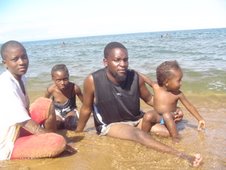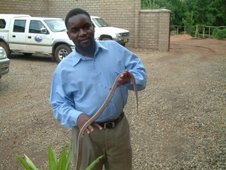I WELCOME you!
Dear Good People,
I warmly welcome you to my Blog and it is my profound hope that you will find it useful and worth the time you spend on it. On this Blog, I have posted some of the articles and pieces that I have writen just for record purposes and also for sharing. You might have read these articles in the papers but it could also be possible that you missed them.
Please be advised that these are my toughts and purely my opinions. You are free to comment on them and/or to critic them. I will appreciate any of your comments.
Thank You.
Hastings Maloya
+265 888864241 or +265 999950953
I warmly welcome you to my Blog and it is my profound hope that you will find it useful and worth the time you spend on it. On this Blog, I have posted some of the articles and pieces that I have writen just for record purposes and also for sharing. You might have read these articles in the papers but it could also be possible that you missed them.
Please be advised that these are my toughts and purely my opinions. You are free to comment on them and/or to critic them. I will appreciate any of your comments.
Thank You.
Hastings Maloya
+265 888864241 or +265 999950953
About Me
- Hastings A. MALOYA
- Mulanje, Southern Region, Malawi
- Is an experienced journalist, writer, specialist in development communications, public relations, publications, desktop publishing, information technology, photography, environmental education and rural development. Hastings Maloya is currently working as Programme Officer responsible for Environmental Education, Awareness and Communications for the Mulanje Mountain Conservation Trust (MMCT) since September 1, 2002. Hastings, comes from Tradional Authority Mabuka in Mulanje District, is an Adventist Christian, and has two daughters Eva and Eve.
BINGU - A high class leader who never forgot his roots
by Hastings Maloya
His Excellency Ngwazi Professor Bingu wa Mutharika who died on April 6, 2012 was not only the President of the Republic of Malawi, he was traditionally a true son of Malawi who was never influenced by western ideologies. As we celebrate his life today, we thank God that for 78 years, among us lived a man who truly believed that whatever accomplishments one attains, it is important to preserve culture and tradition.
According to available records both local and international, late Professor Bingu wa Mutharika went to India where he earned his Bachelor's degree in Economics. Subsequently, he attended the Delhi School of Economics graduating with a M.A. degree in economics. He later obtained a PhD degree in development economics from pacific western university. The late Professor also completed courses on business management, financial analysis, trade promotion, political leadership, regional economic co-operation and human relations.
The late Professor Mutharika then served in the Malawi civil service. He has served as Administrative Officer in the Government of Malawi and Zambia. He was offered the Deputy Governorship of the Reserve Bank of Malawi and appointed Minister of Economic Planning and Development in 2002. He also worked at the World Bank and at the United Nations Economic Commission of Africa, and was once Secretary General of the Common Market for Eastern and Southern Africa COMESA, covering 22 member states.
And here is a man, despite all his impeccable accomplishments, he never forgot his roots. He remembered where he came from and strived to promote his culture. Late Professor Bingu wa Mutharika, popularly known as Mapwiya Muulupalhe, among the Lhomwe folks, will fondly be remembered as founder and patron of Mulhako wa Alhomwe.
Mulhako wa Alhomwe, which has become household name, is a non-governmental, non-religious, non-political and non-profit making organization formed with the aim of reviving, developing, promoting and preserving the Alhomwe traditions, culture, customs and cultural heritage.
Bingu himself was a lhomwe to the heart. He knew the tribe’s traditions, customs and beliefs. He knew its dances and costumes. His promotion for culture was genuine and no wonder Mulhako wa Alhowe –which means a gateway to the Lhomwe culture and tradition - was dear to his heart.
Headquartered at Chonde in Mulanje district, the cultural grouping aims at developing, reviving and preserving the history, traditions, culture and customs of the Ahlomwe people with the view of enhancing their awareness, knowledge understanding and appreciation of their origins, roots and heritage. The organisation also encourages the Ahlomwe people to learn, speak and write their language as a means of developing and preserving their identity.
In his own words, the late Ngwazi Professor Bingu wa Mutharika said it had been his childhood idea to form a cultural heritage grouping that would promote the Lhomwe culture. This was in realization that the Lhomwe culture was dying a slow and painful death. Late Mutharika said he founded Mulhako wa Alhomwe to provide exposure to cultural traditions of the Lhomwe tribe.
Launched on October 25, 2008, the grouping has enabled the Alhomwe people to develop and appreciate their dances, songs, yarns, proverbs, folklores, arts and crafts, thereby enhancing their contribution to the social, cultural and economic development of Malawi.
Since the formation of Mulhako wa Alhomwe, the Alhomwe people across Malawi have come out and formed different committees with their cultures and traditional dances exposed. The association has also promoted cordial working relationships among different cultures in Malawi through exchange visits.
The Alhomwe people constitute the second largest tribe in Malawi.
Notwithstanding the significant contributions by the tribe to the social, cultural and economic development of Malawi, documented reports and records of non-Alhomwe researchers show that the Alhomwe had always been relegated to play an insignificant role in the cultural development of this country. The colonial administrations were largely responsible for implementing derogatory policies and attitudes that excluded the Alhomwe from the mainstream of social and cultural evolution of this country.
It is not surprising therefore that Lhomwe rich traditions, culture and customs disappeared over the years, and many Lhomwe people changed their names and preferred to hid their identify in order to survive the social and cultural onslaught.
The launch of the Mulhako wa Alhomwe marked as the renaissance of a culture that was dying. However, it was not all rosy as other quarters expressed fears that the group was established for political purposes. Mapwiya Muulhupalhe Bingu wa Mutharika, maintained that he never initiated the formation of the group on political grounds.
“This is not a political or religious grouping,” said Wa Mutharika adding, “the group is about promoting Alhomwe cultural and traditional values including our language." Mutharika insisted that by preserving a culture, one keeps the traditions, family values, sociological standards, morals and language and maintains personal identity.
Today Lhomwe is no longer a forgotten tribe. After reviving its cultural beliefs, traditions, language, songs, dances and the known unique cultural living, Lhomwe is now positioned on the international map, with support from United Nations.
Through its Educational, Scientific and Cultural Organisation (UNESCO), the world body supported the inventory of intangible cultural heritage of the Lhomwe culture at grass roots level. An intensive inventory research and field work in Mulanje, Thyolo, Chiradzulu, Zomba and Phalombe districts unearthed the unique living of the Lhomwe people, their heritage documented and a recollection of the way of life traced. Lhomwe was recognised in a project on “Community Based Inventory of Intangible Cultural Heritage” funded by UNESCO in collaboration with the Flanders Fund-In-Trust Cooperation. This was a pilot project in six selected countries in Sub-Saharan Africa which included Botswana, Lesotho, Malawi, Swaziland, Uganda and Zambia.
According to UNESCO officials, the Lhomwe community was chosen largely because, unlike in other regions where similar activities have been done before, very little if any, had been done to expose the culture of southern region at global level. And Lhomwe was seen to be better organised through its cultural heritage grouping, the Mulhako wa Alhomwe.
This was a landmark in the history of Malawi that culture and cultural heritage can be systematically and professionally documented as this will help to maintain our history for the sake of the future generations.
While others will remember him as a politician, others will remember him as an economist; some will remember him as a believer in culture and tradition. Ngwazi Professor Bingu wa Muthariaka may be gone but his legacy lives on
Subscribe to:
Posts (Atom)






